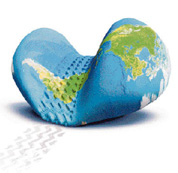The Big E
Commentary on environmental news
BY LARRY CRENSHAW

For example, the United States requires shrimp fishermen to use turtle excluder devices to keep endangered turtles from being caught and drowned in the shrimp nets. Because of a protest, the United States cannot keep shrimp from other countries out of the U.S. even when those countries kill turtles. This not only threatens to destroy turtle species, it puts U.S. shrimpers at an unfair disadvantage.
Examples involving Canada: Britain and France have building codes that restrict the use of asbestos; Canada wants them overturned. Europe wants to restrict the import of seal pelts; Canada disagrees. Some countries want to limit imports of wood cut from old-growth forests; Canada is protesting.
The United States is using the WTO to fight countries that don't want to import our genetically modified seed and food. The U.S. and Canada claimed successfully that Europe could not reject meat from hormone-fed animals. Attempts by governments to buy more recycled paper or to label products as environmentally friendly are being challenged under WTO rules.
For five years, the WTO has in every case ruled against the environment and against fair labor practices. Each decision has been made by a panel operating in secret, and under the rules of the WTO each decision is binding. While such decisions might be good for countries without an environmental ethic, without democracy, without human rights, and while such decisions might be good for corporations, they are anti-environmental, anti-democratic, anti-people. Add the fact that child labor can also not be challenged under the WTO, and it makes sense that the environmental, labor, and human rights communities were all well-represented in Seattle.
The Good, the Bad, and the Ugly News: The misnamed "Global Climate Coalition" is an industry group doing everything in its power to fight the idea of global warming and climate change. The good news is that Ford Motor Company is the first automobile maker and the first major U.S. company to leave the Global Climate Coalition. A Ford spokesperson said, "Governments and industry should act straightaway" to confront the problems of global warming. Note to Ford: stop building SUVs.
Very Bad News: The Cato Institute has just released a report that recommends the sale of all land owned by the U.S. government -- all national parks, all national forests, all military bases, all wildernesses.
Very, Very Bad News: The author of the report is the public lands policy advisor to George W. Bush.
Ugly News: Scientists report that the average underwater depth of Arctic ice has declined 40% since 1958. Meanwhile, 37,000 square kilometers of Arctic ice per year has been lost for the last 20 years. Probable culprits are global warming and climate change caused by human activity.
Larry Crenshaw is a native South Carolinian now writing and doing environmental work in Alabama.

